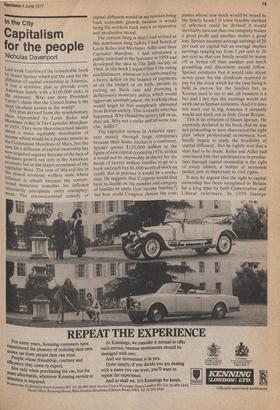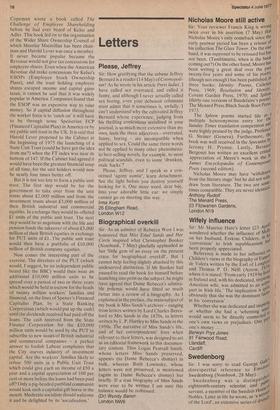In the City
Capitalism for the people
Nicholas Davenport
Last week I reviewed the remarkable book hY Stuart Speiser which put the case for the diff4sion of capital ownership in America. It was a tentative plan to provide every American family with a $100,000 stake in the economy. Who can deny President Carter's claim that the United States is the mO5 t idealistic nation in the world?
The plan derived from the revolutionary Ideas expounded by Louis Kelso and Mortimer Adler in The Capitalist Manifesto of 1958. They were then concerned mainly about a more equitable distribution of income which would be a popttlar answer to the Communist Manifesto of Marx, but the case for a diffusion of capital ownership has now acquired urgency because of the lack of adequate growth not only in the American economy but in the major economies of the capitalist West. The root of this evil lies in ,the mixed economy welfare state where inflation is inbuilt because the conventional monetary remedies for inflation
necessarily precipitate more unemploym capital diffusion would in my opinion bring back economic growth because it would bring the workers back into a co-operative and productive mood.
The curious thing is that I had arrived at this conclusion long before I had heard of Louis Kelso and Mortimer Adler and their Capitalist Manifesto. I had advocated a public unit trust in the Spectator in 1958 and developed the idea in The Split Society of 1964. In this book I argued that if the ruling establishment, whenever it is confronted by a heavy deficit on the balance of payments or on the budget or on both, persists in putting up Bank rate and pursuing a deflationary monetary policy, which would aggravate unemployment, the working class would begin to feel completely alienated from British society. This is exactly what has happened. Why should the misery fall on us, they ask. Why not a strike and let some one else suffer?
The capitalist system in America operates mainly through large companies because their home market is a continent. Speiser quotes $120,000 million as the figure of new capital created in 1976, so that it would not be impossible in theory for the heads of twenty million families to go to a bank and each buy $6,000 worth of stock on credit. But in practice it would be a confusion. He suggests that Congress would first have to decide on the number and category of families to apply (low income families?) but how could Congress choose the corn pan ies whose new stock would be issued to the family heads? If some feasible method of selection could be devised it would inevitably turn out that one company makes a good profit and another makes a good loss. Speiser assumes average earnings of 20 per cent on capital but an average implies earnings ranging say from 5 per cent to 30 per cent so that one family would be worse off or better off than another and much grumbling and discontent would follow. Speiser estimates that it would take about seven years for the dividends received to pay for the stock which for the time being is held in escrow for the families but, as Keynes used to say to me, all business is a bet and I bet that the earnings would not work out as Speiser estimates. And if it does not work out in big America it certainly would not work out in little Great Britain.
This is no criticism of Stuart Speiser. He expressly declared in his book that he was not pretending to have discovered the right plan 'when professional economists have hardly begun to study the feasibility of capital diffusion'. But he rightly said that a start had to he made. Kelso and Adler had convinced him that participation in production through capital ownership is the right of every citizen, a matter of economic justice just as important as civil rights.
It may be argued that the right to capital ownership has been recognised in Britain for a long time by both Conservative and Liberal reformers. In 1958 George
Copeman wrote a book called The Challenge of Employee Shareholding before he had ever heard of Kelso and Adler. This book led on to the organisation of the Wider Share Ownership Council of which Maurice Macmillan has been chairman and Harold Lever was once a member. It never became popular because the Revenue would not give tax concessions for employee shares. Even when the American Revenue did make concessions for Kelso's ESOPs (Employee Stock Ownership Plans), and the trust holding employee shares escaped income and capital gains taxes, it cannot be said that it was widely popular in America. Companies found that the ESOP was an expensive way to raise money. So if capital' diffusion throughout the worker force is to 'catch on' it will have to be through some Speiserian FCP (Financed Capitalist Plan) in America or by my public unit trust in the UK. It is said that Harold Lever proposed to the Cabinet at the beginning of 1975 the launching of a State Unit Trust (could he have got the idea from me?) when the FT index was near its bottom of 147. If the Cabinet had agreed it would have been the greatest financial coup of all time, for the unit holders would now be nearly four times better off.
But it is not too late to form a public unit trust. The first step would be for the government to take over from the unit trusts about £2,000 million and from the investment trusts about £3,000 million of their British industrial and commercial equities. In exchange they would be offered £1 units of the public unit trust. The next step would be to negotiate with the life and pension funds the takeover of about £5,000 million of their British equities in exchange for PUT units of £1. The public unit trust would then have a portfolio of £10,000 million of British company equities.
Now comes the interesting part of the exercise. The directors of the PUT (which would, I suggest, be an independent public board like the BBC) would then issue an additional £10,000 million units to be spread over a period of two or three years which would be held in escrow for the heads of twenty million workers' families and financed, on the lines of Speiser's Financed Capitalist Plan, by a State Banking Corporation (which would put up the cash) until the dividends received had paid off the loans. The cash received from the State Finance Corporation for the £10,000 million units would be used by the PUT to subscribe to new issues of British industrial and commercial companies — a perfect answer to foolish Labour complaints that the City starves industry of investment capital. Are the workers' families likely to refuse 500 units in a Public Unit Trust which could give each an income of £50 a year and a capital appreciation of 100 per cent or more before the loans had been paid off? Only a pig-headed purblind communist would look such a capitalist gift horse in the mouth. Moderate socialists should welcome it and be delighted by its 'socialisation.'



































 Previous page
Previous page